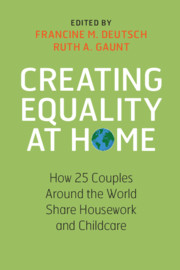Book contents
- Creating Equality at Home
- Advance Praise for Creating Equality at Home
- Creating Equality at Home
- Copyright page
- Dedication
- Contents
- Contributors
- Acknowledgments
- Development and Gender Equality in Participating Countries
- Setting the Stage
- Consciously Creating Equality
- Violating Social Norms
- 8 Indonesia
- 9 Croatia
- 10 Bhutan
- 11 Hungary
- 12 USA: Southern California
- Prioritizing Family
- Drawing on Lessons from Families of Origin
- Using Government Policies
- What We Have Learned
- Index
- References
10 - Bhutan
from Violating Social Norms
Published online by Cambridge University Press: 03 June 2020
- Creating Equality at Home
- Advance Praise for Creating Equality at Home
- Creating Equality at Home
- Copyright page
- Dedication
- Contents
- Contributors
- Acknowledgments
- Development and Gender Equality in Participating Countries
- Setting the Stage
- Consciously Creating Equality
- Violating Social Norms
- 8 Indonesia
- 9 Croatia
- 10 Bhutan
- 11 Hungary
- 12 USA: Southern California
- Prioritizing Family
- Drawing on Lessons from Families of Origin
- Using Government Policies
- What We Have Learned
- Index
- References
Summary
Each of these chapters contains a case study of a couple from the relevant country. Each includes a description of the everyday life of the couple with respect to the division of housework and childcare, a recounting of the history of their relationship and how it became equal, a discussion of how they balance paid work and family, and an analysis of the factors that facilitate their equality. Those factors include their conviction in gender equality, their rejection of essentialist beliefs, their familism, and their socialization in their families of origin. By showing how and why they undo gender, these couples provide lessons on how equality at home can be achieved.
Keywords
- Type
- Chapter
- Information
- Creating Equality at HomeHow 25 Couples around the World Share Housework and Childcare, pp. 121 - 133Publisher: Cambridge University PressPrint publication year: 2020



